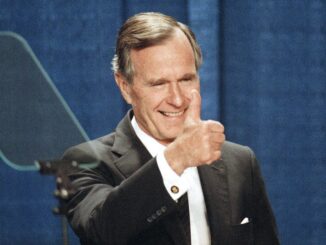Election season is upon us.
Republicans in Iowa and New Hampshire are about to cast the first ballots of the 2024 election. While the contest between Trump, Haley, DeSantis, and Ramaswamy is in the headlines, a very different contest, one over ideas, is being waged for the soul of the GOP.
Forget about old labels like “Neocon,” “Tea Party,” or “Establishment.” Two distinct sets of ideas have taken shape. The first is called freedom conservatism, which is based on classical liberalism and emphasizes individual rights and limited government. These ideas were championed by economist Friedrich Hayek. The second idea is called common good conservatism, which seeks to use the power of the state to promote a conservative “common good” and is promoted by intellectual Patrick Deneen and the so-called “New Right.”
Which of these conservative philosophies should our nation and the Republican Party follow?
Deneen and the New Right reject classical liberalism and many of the Enlightenment principles enshrined in our founding documents. Why? Deneen argues that classical liberalism has resulted in the collapse of morality, with elites dominating the common man. His philosophy is a blend of right-wing traditionalist views on culture and community mixed with pre-Enlightenment statist values on government, which elevates the needs of the collective over the individual, claiming to stand for the populist many against the elitist few.
What is the “common good?” To a Sean Hannity listener in Fayetteville, it might mean rooting out CRT from schools. To a campus activist in Durham, it could mean deconstructing traditional institutions and limiting free speech. To a banker in Charlotte, it might mean boosting GDP.
The lack of definition is a boon for those hungry for power because they can mold “common good” to their interests. This is why ideas based on “the common good” have found a home in populist figures more concerned about power than ideas. The irony is that the lack of specificity and agreement on what “common good” politics actually are, will likely prevent the “common good” outcomes its practitioners seek.
Whose job it is to provide for the “common good?” Deneen and the New Right claim it’s the state’s responsibility. Karl Marx would agree. Collectivists old and new, left-wing and right-wing, want the government responsible for providing for “the good of the whole.” Contrast this with Ronald Reagan who said, “Government is not the solution to our problem, government is the problem.”
Hayek’s ideas have been around for a long time, but only recently has classical liberalism come under attack from within the GOP. Classical liberalism has thus been rebranded as “Freedom Conservatism.”
This philosophy maximizes individuals’ freedom of choice in economic and political life. The outcome is a society (the sum of free individuals) with greater economic prosperity, increased political pluralism, and more opportunity for individuals to shape their future. Reagan advocated for a society based on individual rights and divorced from collectivist thinking. He would go on to say, “if we look to the answer as to why for so many years we achieved so much, prospered as no other people on earth, it was because here in this land we unleashed the energy and individual genius of man to a greater extent than has ever been done before. Freedom and the dignity of the individual have been more available and assured here than in any other place on earth.”
Freedom conservatives believe the primary role of providing for the “common good” sits with the family, churches, businesses, non-profits, and community organizations with the government playing a secondary role. This skepticism of state power results in the reduction in size and scope of government. This doesn’t mean shrinking from foreign threats or adopting libertarianism, but following Reagan’s philosophy of liberty at home and peace through strength on the world stage.
The GOP is about to pick its nominee. Don’t forget about the battle over ideas. The battle between collectivism and individualism used to be waged between the parties. Now it’s being waged within the GOP.
When casting your ballot, I urge you to remember why our country is great. The American Dream is based on individual freedom and the belief that with opportunity and hard work, anything is possible. The ideas of the Declaration of Independence and Constitution are just as relevant today as they were over 200 years ago. It’s more important now than in any other time in my life for the GOP to remember its identity as the party of limited government, individual freedom, and constitutionalism.
Karl Beckstein is a conservative activist and lives in Raleigh.


